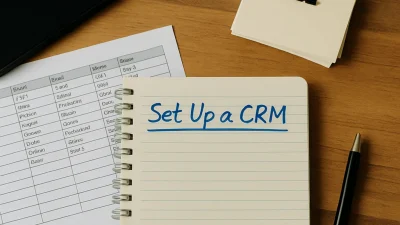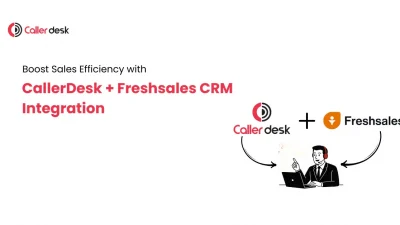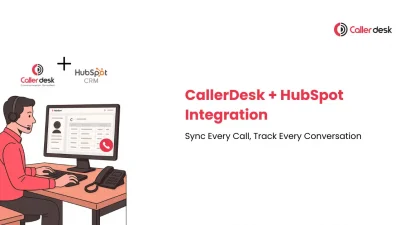If you work in finance — like in a bank, as a loan officer, insurance agent, or financial advisor – you already know how hard it is to manage customers.
You have to deal with:
- A lot of customer details (names, phone numbers, bank info, documents)
- Important rules and laws you must follow
- Customers who want fast replies and personal attention
It’s easy to make a mistake – like missing a follow-up or sending the wrong info. And one small mistake can make a customer lose trust in you or leave your business.
That’s where CRM for finance helps.
A CRM is a simple software that keeps everything in one place. It helps you:
- Save all customer info neatly
- Remember tasks and meetings
- Send follow-up messages automatically
- Work faster and with fewer mistakes
- Give better service to every customer
In this blog, we’ll explain what a finance CRM is, how it works, and why it’s important – all in easy, simple words anyone can understand.
What is CRM for Finance?
CRM stands for Customer Relationship Management.
It’s a type of software that helps you manage your clients — their contact details, financial goals, meeting notes, follow-ups, documents, and more — all in one organized system.
But CRM for finance is not like any regular CRM. It’s made specifically for banks, financial advisors, loan agencies, and insurance companies.
Think of it as your digital assistant that:
- Reminds you about follow-ups
- Stores all client records
- Keeps your team connected
- Helps you stay compliant with laws
Why Do Financial Services Need a CRM?
Still using Excel or sticky notes to manage clients?
That might’ve worked 10 years ago — but today, it slows you down, creates confusion, and risks losing valuable customers.
Modern finance teams are moving to CRM software because it’s faster, safer, and smarter.
Here’s what a CRM for finance actually solves:
1. All Customer Data in One Place
No more hunting for emails, searching folders, or checking multiple apps.
With a CRM:
- You get one dashboard for everything
- Access contact info, meeting notes, documents, and account details instantly
- Your entire team can see the latest updates without asking around
Imagine opening one screen and knowing exactly where things stand with every client.
2. Offer Personalized, VIP-Level Service
Clients don’t want to repeat themselves every time they call.
With CRM:
- You see their full history – past transactions, financial goals, preferences
- You can give faster, smarter advice
- Every touch feels personal – like you remember everything
This builds trust – and trust brings long-term clients.
3. Automate the Repetitive Stuff
Your time is valuable. Why waste it on manual tasks?
CRM takes care of:
- Appointment reminders
- Follow-up emails
- Birthday messages
- Task assignments
You get more done with less effort — and nothing slips through the cracks.
4. Stay 100% Compliant
The finance world is strict about data security and legal rules.
A good CRM helps you:
- Store sensitive data securely
- Set user permissions (who can see what)
- Keep audit logs for all actions
- Follow industry laws like RBI, SEBI, GDPR, etc.
One mistake in finance can cost you your business. CRM helps you stay safe.
5. Keep Your Team in Sync
Finance work often involves multiple teams – sales, support, advisors, backend staff.
Without a CRM:
- Teams work in silos
- Clients get mixed messages
- You lose time chasing updates
With a CRM:
- Everyone works from the same system
- Notes, documents, and status are visible to all
- Your team delivers a smooth, professional experience
How CRM Helps Financial Professionals
1. For Financial Advisors: Serve Clients Like a Pro
As an advisor, your job is all about relationships and trust. CRM helps you keep everything organized and personalized.
- See full client profiles: Know their income, investments, past conversations, and goals – all in one place.
- Track portfolios easily: Keep an eye on every client’s investment performance without jumping between tools.
- Set and follow goals: Help clients save, invest, or plan for retirement — and track their progress over time.
- Never miss a check-in: Get reminders to follow up, schedule meetings, and update records on time.
2. For Sales Teams: Close More Deals, Stress-Free
Selling financial products is tough — but CRM makes it smoother.
- Capture leads automatically: From your website, emails, or forms — every lead gets logged in real-time.
- Assign leads smartly: New leads go to the right team member based on region, interest, or deal size.
- Track every step: Know exactly where each deal stands — from first contact to final sign-up.
- Less paperwork, more selling: CRM fills out tasks and reminders, so you spend more time talking to clients.
3. For Support Teams: Solve Problems Faster
Clients want quick answers — and CRM gives your support team everything they need.
- See client history instantly: Know their account, past issues, and conversations before picking up the call.
- Resolve issues faster: No more asking “Can you explain again?” — everything is already in the system.
- Set smart follow-ups: Get alerts if a case is pending, needs escalation, or requires feedback.
- Team collaboration: Loop in advisors, sales, or compliance teams without switching platforms.
4. For Marketing Teams: Run Smarter Campaigns
Marketing in finance isn’t just about ads – it’s about sending the right message to the right person. CRM makes that possible.
- Segment your audience: Filter contacts by age, income, products used, or interests.
- Run targeted campaigns: Send personalized emails or WhatsApp messages based on each segment.
- Track performance: See open rates, click-throughs, and conversions – live.
- Score leads automatically: Let the CRM tell you who’s ready to buy and who needs nurturing.
What to Look for in a CRM for Finance
Not every CRM is built for financial businesses. If you’re in banking, wealth management, insurance, or lending, you need features that are made specifically for your industry.
Here’s what to look for:
1. Secure Data Storage
Finance involves sensitive data like income, investments, and personal ID details. Your CRM should protect this data with strong security features such as:
- End-to-end encryption
- Role-based access control (only certain people can see certain data)
- Audit logs to track who accessed what and when
This helps keep your business safe and compliant with regulations like GDPR, CCPA, or RBI guidelines.
2. Contact and Lead Management
You should be able to store every client’s name, contact info, communication history, and financial details in one place. A good CRM:
- Keeps a record of every lead from first contact to final deal
- Makes it easier to reach out when the timing is right
- Keeps a history of calls, meetings, emails, and notes
This means no more losing track of prospects or repeating information.
3. Sales Pipeline Tracking
Financial products take time to sell. You need a clear view of:
- Where each prospect is in your sales funnel
- Which deals are stuck or need a push
- What your expected revenue looks like for the month or quarter
This helps sales teams prioritize efforts and close more deals.
4. Reports and Dashboards
Guesswork doesn’t work in finance. A great CRM shows you clear reports and visual dashboards so you can:
- Monitor lead conversions
- Track team performance
- Understand client trends
- Make data-driven decisions
And you shouldn’t need an IT expert to create these reports — the best CRMs let you do it with just a few clicks.
5. Easy Integration with Other Tools
A finance CRM should work with the tools you already use, such as:
- Accounting software (like Tally or QuickBooks)
- Email tools (like Outlook or Gmail)
- Communication apps (like WhatsApp or Slack)
- Portfolio management tools
The goal is to avoid manual copy-pasting and save your team time by syncing everything automatically.
6. Task and Workflow Automation
A good CRM should save you time by handling repetitive tasks – not create more work.
Look for features that:
- Send automatic appointment reminders to clients
- Assign follow-up tasks to sales reps
- Trigger alerts when a deal moves forward
This makes sure nothing slips through the cracks.
7. Document Management
Financial work means handling a lot of documents — applications, ID proofs, income statements, contracts, and more.
A finance CRM should allow you to:
- Upload all client documents in one secure place
- Tag and organize them properly
- Access them easily during meetings or calls
This saves time and prevents lost files or email clutter.
Choosing the Right CRM That Fits Your Finance Business
1. Check Your Budget
Begin by setting a budget that works for your business size and future goals.
Some CRMs are free to start with, while others charge monthly fees.
Make sure the pricing fits your budget, not just today — but also as your business grows. Compare the tools and support each CRM offers to see which gives you the most value. Don’t just choose the cheapest; choose the one that gives you the most value.
2. Make Sure It’s Easy to Use
If your team finds the CRM confusing, they won’t use it properly.
Choose a CRM that has a clean, simple interface — something your team can learn quickly without long training sessions.
You can also ask for a free trial or demo to test how user-friendly it is before committing.
3. Look for Scalability
Your business will grow. Your CRM should grow with you.
Pick a system that works well whether you have 5 clients or 5,000.
It should be able to handle more users, more data, and more features without slowing down or becoming too expensive.
4. Confirm Data Security and Compliance
Finance businesses handle sensitive information.
The CRM you choose should follow all required laws like RBI rules (in India), GDPR (in Europe), or other local data protection standards.
It should offer features like data encryption, user permissions, and audit logs to keep customer data safe and secure.
5. Evaluate Customer Support
Even the best CRM users run into issues.
That’s why good customer support matters.
Check if the provider offers:
- 24/7 live support
- Help documents or videos
- Quick response times
A strong support team makes sure your CRM keeps running smoothly.
Conclusion
CRM for finance isn’t just helpful — it’s essential. It keeps all your client data organized, automates daily tasks, and helps you deliver faster, more personal service. Whether you’re in sales, support, or advisory, the right CRM makes your team more efficient and your customers more satisfied.
CallerDesk offers a complete cloud calling solution with seamless CRM integration – so you can manage calls, customer data, and daily workflows all in one place.





